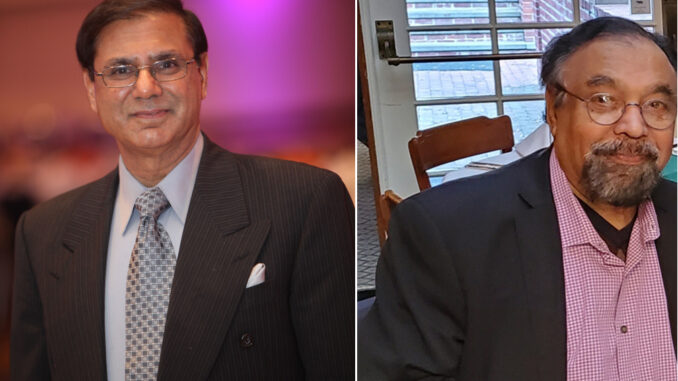
NEW YORK (TIP): On Thursday June 16th, exactly a month after the first session, the Association of Indians in America (AIA) hosted its second conferenceon Awareness and Empathy at 8 PM. National President Gobind Munjal welcomed all the attendees including some of AIA’s past presidents and trustees. Mr. Munjal introduced the speaker Dr. Shivaji Sengupta and the moderator Asmita Bhatia, trustee of AIA. As in the first session, Shivaji Sengupta led the discussion. Moderator Asmita Bhatia helped start the discussion by making the parameters of the present session clear. Although awareness and empathy can be successfully used in many situations, private, corporate and political, she said, our discussion was going to be limited to two areas: personal relationships between family and friends, and about relationships in the workplace. At Mr. Gobind Munjal’s suggestion, Sengupta began by restating the definitions of Awareness and Empathy. Awareness is our ability to be conscious of our environment, particularly, the people, but it also includes our being conscious of our own selves, especially in terms of our feelings. He explained Empathy as being able to intuitively understand how another person is feeling as he or she is engaging you over an issue important to both.
Next, Shivaji Sengupta said that Awareness and Empathy are both states of being: you are aware of someone or something; you are in a state of empathizing with another person. He explained that while everyone has awareness and empathy these two can be developed into skills. How? By constantly practicing the subskills that culminate into Awareness and Empathy. These skills are Observing, Listening, responding with involvement and feelings(Asmita Bhatia added these two conditions). Skillful observation makes you select the object of your choice with controlled attention and focus. It is possible to raise this to a skill level by constantly practice,selecting out a figure from the ground where the observation is taking place, controlling your power of attending and focusing sharply on the object. Similarly, responding has subskills also which, with practice, turns into a skill. These subskills are acquiescence in responding and satisfaction in response. If we are interested in and involved with the object of our attention, we transit from acquiescence to satisfaction in response.
Dr. Sengupta’s ideas led to a lively discussion among the members. They took up one another’s points and elaborated on them. Gunjan Rastogi asked what does one do when one of the parties in discussion turns hostile and offensive? Withdrawing temporarily, was the answer, keeping open all the channels of communication and letting the hostile person be aware that the channels are open. What is the difference between hearing and listening? Asked Nilima Madan. Hearing is general, while listening is more specific. Listening is targeted hearing. Dr. Bharti Palkhiwala spoke about the importance of eye-contact, and periodic responses that told the speaker that the listener was genuinely interested in him/her. She called it building an alliance with the listener. Asmita Bhatia spoke of the importance of calmness as one is talking to a hostile person. Sengupta elaborated that this calm withdrawal is not a final withdrawal. The engagers need to remember their purpose of the discussion and whether differences in values (male/female; parent/child, supervisor/supervisee) are preemptory (unnegotiable) or ameliorative (can be discussed further at least in terms of methods of achieving a goal). Mr Gursharan Kalra pointed out whether with a change in one’s status (in life or in society) one can be in a difficult position in terms of others’ expectation.Sengupta replied yes, and in such cases, it is best to be authentic, accept that one’s status in life has changed, but plead to be accepted as one is now. Uma Swaminathan asked whether there is a difference between the way a male observes and responds from the way a female does the same things. Curiously, interesting as this question was the question wasn’t discussed in much detail, which it deserved. Shivaji Sengupta is still thinking about this question and would like to get back to Ms. Swaminathan on this.
To bring out some of these issues, Shivaji Sengupta gave a summarized situation of a father and daughter who were engaged in a controversial situation, putting the parent and offspring on culturally opposite sides. Sengupta described how the father engaged his daughter into roleplaying by taking the opposite viewpoint and arguing in favor of it. The daughter became the father; the father became the daughter. In doing so, Sengupta, said they had an almost first-hand feeling about what it is like to be in the other position. Empathy developed in each, the daughter, and the father. In the end, the parents asked the daughter to decide, now that she had considered both the father’s and the daughter’s points of view. The parents assured the daughter that whatever she decided, the parent would accept.Finally,the outcome was favorable. Many participants appreciated the narrative as a prime example of developing empathy.
The members all agreed that this second session on Awareness and Empathy was full of lively, intelligent and intellectual discussion and was a huge success. There was even talk of continuing this trend and most of the attendees requested the management to have a third session for more discussions of this type both via Zoom andin person, as these issues are real and need more insight into this. Mr. Munjal responded that they will send the recording to everybody who were not able to attend the session due to prior commitments and would very actively think about it ifmost of those people also would want it.
The program was concluded at 9:30 PM by vote of thanks fromtheNational Secretary Gunjan Rastogi.
(Based on a press release issued by Gobind Munjal)





Be the first to comment